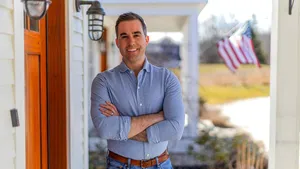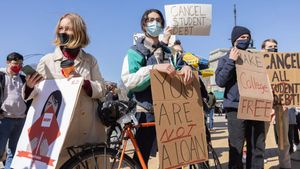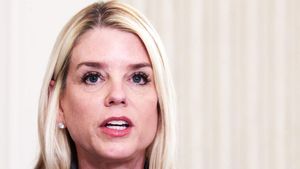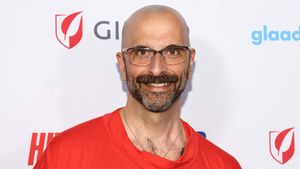Treatment GuideJust DiagnosedSex & DatingAfrican AmericanStigmaAsk the HIV DocPrEP En EspañolNewsVoicesPrint IssueVideoOut 100
CONTACTCAREER OPPORTUNITIESADVERTISE WITH USPRIVACY POLICYPRIVACY PREFERENCESTERMS OF USELEGAL NOTICE
© 2025 Pride Publishing Inc.
All Rights reserved
All Rights reserved
By continuing to use our site, you agree to our Privacy Policy and Terms of Use.
Making the grade?
The figure usually quoted for new HIV infections in this country is 40,000 annually, yet the last time U.S. data showed figures at that level was in 2000. Each year since, the rate has increased by 2%'until 2003, when the increase was 4%. Half of these new infections are occurring in people under 25, according to health officials.
With this statistic in mind, Benjamin Ryan takes a look at two examples of what is happening on U.S. college campuses. First, we visit the Deep South, where a year ago health officials announced the discovery of an outbreak of HIV cases among black college students, causing a national media frenzy. What have the leaders of these institutions learned over the past year about increasing prevention efforts? Second, we head north to where a young man who found out he was HIV-positive while in college has a mission to make his peers aware that HIV is still around.
By the time you read this article the news of the December 2004 tsunami that had worldwide effects will have drifted farther into the back pages of the newspaper. And as the the images of destroyed villages recede from the public's memory, South Asian governments and global aid organizations will struggle to sustain the world's commitment to repairing the region's damage.
A comparable challenge faces AIDS activists in North Carolina. In February 2004'just a year ago'news of an HIV outbreak among African-American students in the state's colleges and universities (including both historically black schools and other institutions) resulted in a flurry of headlines, jolted school administrators, and sent a wave of paranoia through students.
Fortunately, this news seems to have compelled a sizable portion of the state's black population to action and for the time being has yielded a significant amount of federal spending. Whether this mobilization is enough to crack the hard shell of social conservatism, homophobia, and denial about AIDS'all of which have fueled this rising epidemic'remains to be seen.
Phill Wilson, founder and executive director of the Black AIDS Institute, a national advocacy group, is optimistic about the attention given to efforts in the U.S. Southeast, saying that 'there has been incremental mobilization' for the cause and that this interest is 'sustained and building.'
Confusion remains, however, about exactly what the outbreak data signified. Talk with AIDS activists from North Carolina and you will frequently hear complaints that the media mishandled the story'that journalists framed the story exclusively as an epidemic among black college students in particular, not in young blacks in general.
'This is a young person's problem,' says Phyllis Gray, project manager in the HIV/sexually transmitted disease prevention and care branch of the North Carolina Division of Public of Health. 'The college angle made it more sensational.'
Gray is correct in her analysis'but only to a point. Here are the hard numbers: From 2000 to 2003 there were 998 men in North Carolina between 18 and 30 who were diagnosed with HIV. There were 84 men who were students (at 37 of the state's colleges), and 87% of them were black. Seven more schools in five other Southeastern states were also linked to the outbreak, leading the Centers for Disease Control and Prevention to conclude that the phenomenon was regional. The final numbers for 2004 are not yet available; according to the state health department, though, the trends have continued, and the numbers could increase drastically.
Campus Connections
So at first glance the outbreak does seem more of an issue concerning young blacks, whether they are in college or not. But data from the North Carolina Division of Public Health also show that in 2000 only 5% in this age bracket who were newly infected were college men and their sexual contacts. By 2003 that figure had jumped to 21%, signaling an emerging epidemic among, primarily, black men. The CDC and University of North Carolina researchers say these college students are at the epicenter, since many of these men shared a network of male sexual contacts.
Case in point: the troubling news that 40% of the HIV-infected college men having sex with other men also reported sex with women during the year prior to their diagnosis. And widely publicized anecdotal information suggests that these men are not having protected sex with their male or female partners.
The number 1 antagonist that public-health efforts are battling is ignorance. In a separate CDC study, even though 40% of HIV-infected college students reported having unprotected anal sex with another man in the previous year, only two men had thought they were likely to contract the virus. This lack of understanding is a result of a complex web of sociopolitical factors, including the resistance of black churches to address sex, HIV, or homosexuality, in addition to a public school system that is rigidly ensconced in teaching abstinence-only sex education.
Peer-Powered Programs
Consequently, the CDC has funneled $1.2 million to the state's health department to establish what is called a Popular Opinion Leader program. It is based on the untested theory that black men who have sex with other men are more likely to absorb HIV prevention messages through a casual conversation with a peer. Further infusions of federal dollars'this particular grant runs out at year's end'will likely hinge on the observable success of this program. 'It's incumbent on us to make sure that interest does not wane,' says John Peebles, deputy head of North Carolina's public-health branch of HIV/STD prevention and care.
To implement the Popular Opinion Leader program, the state health department has contracted with AIDS service organizations in Raleigh, Charlotte, and Greensboro to recruit young blacks who are social leaders in their communities, then school them in the art of spreading public-health messages. Training for the program began in the fall of 2004, and trainees will eventually fan out into public venues where at-risk youths tend to hang out, such as gay bars. The trainees will then try not only to teach other men about preventing disease from spreading but to recruit further word-of-mouth foot soldiers as well. Ideally, the effect should be a public-health message that is spread into as many nooks of the community as possible.
A common worry among HIV prevention advocates is that excessive focus on men who have sex with men will reinforce the already prevalent belief that heterosexuals are not at risk. Leaders of the program stress that it is in its infancy and could one day cover more at-risk groups. Meanwhile, the CDC has also given $200,000 this year (down from 2003'2004 funding levels) to a separate health department initiative, Project Commit to Prevent, which gives money to the state's 12 predominantly black colleges and universities so that they can develop their own peer educator training programs. To date more than 350 students have volunteered.
'It has been amazing, the amount of interest and commitment all of these campuses have demonstrated toward making HIV prevention a priority among the activities that they do,' says Gray of the North Carolina health department.
Back to the Basics
Indeed, collegiate efforts have escalated in the past year, as campuses are sponsoring forums, rap sessions, panels, and conferences as well as World AIDS Day and Black AIDS Awareness Day events. Johnson C. Smith University, for example, is requiring an 'HIV 101' seminar for incoming freshmen. Several of the 12 black colleges have added HIV and STD counseling and testing services. The other schools, which are too small to sustain such facilities, have been more aggressive about demanding the presence of local health departments, which typically visit schools to provide testing every month.
The Black AIDS Institute, which has launched its own national initiative focusing on black colleges and universities, held a leadership conference in October 2004 at the Morehouse School of Medicine to address HIV. More than 100 students from around the country attended.
One man who gained a national profile after news of the outbreak spread was Jonathan Perry, a 28-year-old philosophy and psychology major at Johnson C. Smith who appeared on The Oprah Winfrey Show in 2004 to discuss his life with HIV. Perry says he is so impressed by his peers' passion to fight the virus's spread that 'it's gotten me actually believing that we can see a serious decline in infections among college students.'
One battleground where progress seems unlikely might actually be the most identifiable source of the problem. Under a 1995 state law, North Carolina school districts must teach that abstinence from sex until marriage is the 'expected standard' of behavior, resulting in a limited form of sex education that, according to numerous studies, leads to the kind of ignorance that spurs epidemics such as this one.
In addition, various state and local governments have charged that some programs recklessly provide inaccurate information about safer-sex practices, such as stating that condoms have a high failure rate'which has led to people choosing to forgo any protection in sex. Though each North Carolina school district can opt for comprehensive sex education after notifying residents and holding public hearings, only 12 across the state have done so.
The law is up for its five-year reauthorization this year, and a consortium of public-health groups has delivered a report to the state board of education that pushes for a more liberal policy, away from abstinence-only education. It is uncertain if the board will consider that, according to the 2003 Youth Risk Behavior Survey, by the time North Carolina students are seniors in high school, about 74% are no longer virgins; moreover, only 62% of the state's sexually active high schoolers report condom use.
Jack McKinney, pastor of the Pullen Memorial Baptist Church in Raleigh, is an atypical religious leader: He supports comprehensive sex ed and has locked horns with local school boards over it. He represents a ray of hope for a future movement to prevent HIV/AIDS among the state's black population, as many believe such an effort must come from within the black culture'and not be seen as a cause pushed by the white establishment.
'It just blows my mind that so many people of faith'so many who seem to advocate for the life of young people'would be so callous as to not provide the kind of health education that kids need,' McKinney says. The father of two school-age children, he says he wants his kids to know how to protect themselves from STDs and HIV: 'Those are moral values to me.'
From our Sponsors
Most Popular
BREAKING: Supreme Court rules to save free access to preventive care, including PrEP
June 27 2025 10:32 AM
Thanks to U=U, HIV-positive people can live long, happy, healthy lives
July 25 2025 2:37 PM
Plus: Featured Video
Latest Stories
Amazing People of 2025: Javier Muñoz
October 17 2025 7:35 PM
It’s National PrEP Day! Learn the latest about HIV prevention
October 10 2025 9:00 AM
“I am the steward of my ship”: John Gibson rewrites his HIV narrative
September 16 2025 2:56 PM
“So much life to live”: Eric Nieves on thriving with HIV
September 03 2025 11:37 AM
The Talk: Owning your voice
August 25 2025 8:16 PM
The lab coat just got queer
August 21 2025 10:00 AM
Messenger RNA could be the key to an HIV vaccine — but government cuts pose a threat
August 20 2025 8:02 AM
The Talk: Beyond the exam room
August 13 2025 3:15 PM
The Talk: Navigating your treatment
August 01 2025 6:02 PM
The Talk: Starting the conversation
July 25 2025 4:47 PM
How the Black AIDS Institute continues to fill in the gaps
July 25 2025 1:06 PM
“I felt like a butterfly”: Niko Flowers on reclaiming life with HIV
July 23 2025 12:22 PM
Dancer. Healer. Survivor. DéShaun Armbrister is all of the above
July 02 2025 8:23 PM
1985: the year the AIDS crisis finally broke through the silence
June 26 2025 11:24 AM
VIDEO: A man living with HIV discusses his journey to fatherhood
June 10 2025 4:58 PM
Trump admin guts $258 million in funding for HIV vaccine research
June 03 2025 3:47 PM
Grindr is reminding us why jockstraps are so sexy and iconic
May 02 2025 5:36 PM
HRC holds 'die-in' to protest Trump health care cuts
April 28 2025 2:11 PM


































































